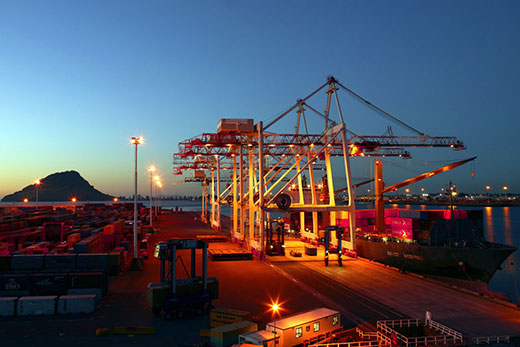The Bay of Plenty's freight services could be brought to a standstill if a biosecurity pest such as the Queensland Fruit fly was discovered near the Port of Tauranga.
That's why the Bay of Connections Freight Logistics Action Group (FLAG) called a meeting of key staff from the Ministry of Primary Industries, Kiwifruit Vine Health and biosecurity operations consultants this week.
The Port of Tauranga sits at the heart of the Bay of Plenty region's freight logistics industry. Photo: Supplied.
'Transport and logistics is a vital link for the vast majority of primary industry export goods that leave the Port of Tauranga annually,” says FLAG co-ordinator, John Galbraith.
'However, our region's freight movements could be constrained or curtailed completely should a major incursion be found in or around the Mount Maunganui area,”
'It's critical that the Bay of Plenty's freight and logistics industry acts ahead of any biosecurity incursion in order to minimise the impact on their operations, protect their future business growth prospects and minimise the impact on the wider economy.”
Andrew Harrison, from Kiwifruit Vine Health, outlined real-life examples from the kiwifruit industry's Psa crisis, including how the issue affected a wide range of associated businesses outside the immediate industry.
'Andrew provided some important insights to this crisis,” adds John, 'particularly in relation to the wider impacts, which came as a surprise to many members of FLAG.”
Forestry biosecurity analyst Bill Dyck also briefed action group members about the potential negative impact on log truck and rail movements if a bug or beetle incursion stopped New Zealand forest growers from exporting for any length of time.
He relayed experiences from Chile's forest industry, which had to deal with import bans by a number of Asian countries that had a significant adverse impact on freight and logistics service providers to the forestry sector there.
'A potential biosecurity incursion could have a significant impact on the freight logistics sector, the wider economy, and the communities in which these companies work and live,” explains John.
'It is up to us all to take precautions and put the planning in place in order to minimise the risks as much as possible.”
The key messages from the briefing included the need for companies to ensure they understand the MPI incursion procedures for imported pest emergencies, and to undertake scenario planning to minimize the impact of an incursion.



0 comments
Leave a Comment
You must be logged in to make a comment.